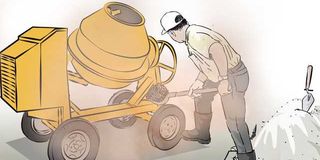Hustle: Of ashy faces and koroga gigs

Koroga refers to pouring a concrete slab. This activity turns men and women into ghosts.
Several months ago, I called my high school old boy, Benson Ndeta, and informed him that I - together with other men whose dating lives were ruined because of koroga - was thinking of taking a class action suit against cement manufacturers.
Koroga refers to pouring a concrete slab. This activity turns men and women into ghosts. Literally.
I advised Ndeta, who’s the chairman of Savannah Cement Ltd, to think of selling each bag of cement with a gorogoro of body lotion to prevent mjengo men from being ghosted by ladies. Yup. I was a victim.
“Omwami, here’s the definition of double jeopardy,” I told him. “having a ‘personal face’, which is also ashy due to koroga.”
Ndeta laughed. But I was serious. Serious as a cousin who’s seen a ghost.
Growing up in the city, male cousins and family friends often slept over in our crib. This practice – called kwayo nindo – was common among Luos, if a family had adult male and female children who didn’t have separate bedrooms.
Snoring
I woke up one night to use the bathroom and startled a cousin who was snoring in the next bed. Cuz fainted. When he regained consciousness, he swore that – because I was ashy due to koroga work I’d done - I was a ghost.
“Do you mean Ghost Mulee?” I asked, but Cuz turned into a real-life bobblehead.
Man, I had an existential crisis of sorts. To prove to myself that I was a human being, I punched myself in the mouth. I still have two lower missing teeth.
There was a Black Mamba bicycle in our bedroom, with handlebars next to my bed’s head. Cuz implored me to be ringing the bicycle’s bell before I got out of bed at night, so he would know it was not a ghost!
“Cuz, like ghosts can’t ring bells!” I protested.
Mama’s jibes
My mama, Nya’Manoah was all about earning an honest living. She was the one belle who loved this boy unconditionally, and never would ghost him, whether he was ashy or glowing.
Nya’Manoah lived upcountry and would often visit her family in the city. She always insisted that, if I was doing construction labour nearby and she was around, I should rush home for lunch instead of eating in a kibanda.
One lunchtime as I walked in, all ashy and fatigued, Nya’Manoah looked at me and sighed: “Nyathina! That’s a face only a mother can love!”
Old school Kenyan mothers knew how to rub salt in, and still make it feel sweet.
I’m an ailurophile. (For my Luo folks, that doesn’t mean someone who loves aluru!)I had a white fluffy kitten that would run to welcome me home. There was a day Nya’Manoah surveyed son and kitty stroll in, then mumbled under her breath: “Look what the cat dragged in!”
“I heard you, mama,” I grumbled.
“Nyathina, I meant that as a compliment,” she flipped the script.
“My bad, mama,” I apologised. “My bad.”
To be fair to mama, I was clad in my dirty, tattered raggedy old mjengo clothes.
One evening when I returned home after a hard day’s koroga, ashy from head-to-toe, Nya’Manoah said she would boast to relatives upcountry that our family now had a white child!
I laughed. I needed to laugh my ashy self off after the hell the supervisor put us through that day.
Because I couldn’t eat hot ugali with bare hands due to the blisters in my palms, I used a spoon. Which is so un-Luo-like. And which made mama to rub in more salt.
“See your human,” Nya’Manoah gossiped with the cat, but audible enough for this cat to hear. “I told you we have a white child.”
The cat purred and wagged its fluffy tail on mama’s cheek. Which is cat-speak for laughter. Laughter at a mjengo man’s expense.





